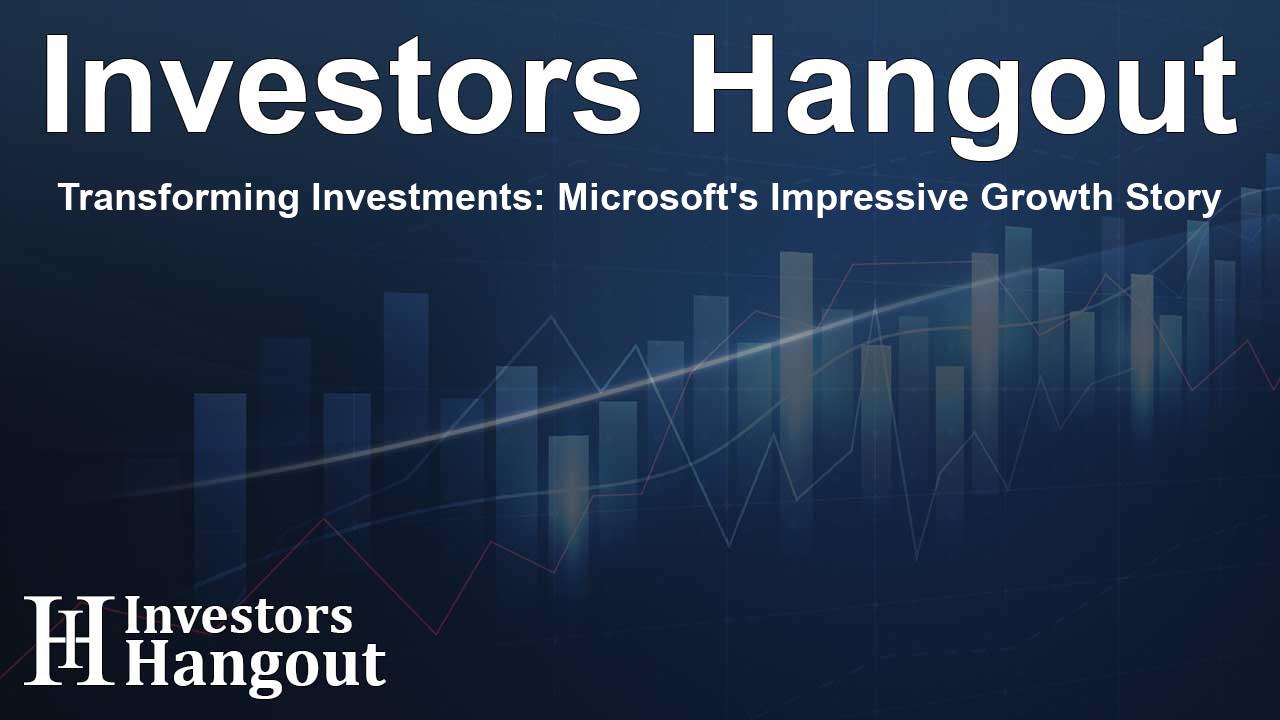Transforming Investments: Microsoft's Impressive Growth Story

Understanding Microsoft's Investment Journey
Microsoft has consistently proven its strength in the market, boasting an impressive annualized performance that surpasses the broader market by 4.31%. Over the past five years, investors have been treated to an average annual return of 19.07%, showcasing the dynamism and resilience of Microsoft Corporation.
The Value of a $100 Investment in Microsoft
Imagine investing just $100 in Microsoft stock (NASDAQ: MSFT) five years ago. Today, that investment would yield a remarkable value of approximately $236.57 based on the current price of $498.45. This substantial growth highlights the power of smart investing, especially within a tech leader like Microsoft.
Decoding Microsoft's Five-Year Performance
One of the standout features of investing in Microsoft is the principle of compounding returns. The significance of this concept cannot be overstated; over time, even modest investments can grow substantially, showcasing just how much difference a few years can make in building wealth.
Why Compounding Returns Matter
Compounding returns function as a snowball effect, where not only interest but also previous gains contribute to future profits. This effect is particularly pronounced in high-growth sectors such as technology, where initial investments can turn into significant financial rewards. Microsoft's consistent innovation and market expansion have allowed it to capitalize on these opportunities.
Looking Ahead for Microsoft Investors
As Microsoft continues to expand its suite of services, from cloud computing to artificial intelligence, the potential for future growth remains bright. With investments in sectors that are driving the future, the company is well-positioned to sustain its upward trajectory. For those considering investing, Microsoft is often viewed as a strong candidate for long-term financial planning.
Frequently Asked Questions
What would a $100 investment in Microsoft be worth today?
A $100 investment in Microsoft made five years ago would be worth about $236.57 today.
What has driven Microsoft's growth in recent years?
Microsoft's growth can be attributed to its innovation in cloud computing, artificial intelligence, and software solutions, positioning the company at the forefront of technology.
How does compounding affect investment returns?
Compounding allows investments to grow exponentially over time, as gains on the investment earn returns in subsequent periods, which accelerates wealth accumulation.
Why is investing in technology stocks like Microsoft beneficial?
Investing in technology stocks often yields higher growth potential due to rapid advancements and increased demand for tech solutions in various industries.
What are the predictions for Microsoft’s future?
Analysts expect Microsoft to continue its positive growth trajectory, fueled by ongoing innovations and market expansions, making it a solid long-term investment.
About The Author
Contact Kelly Martin privately here. Or send an email with ATTN: Kelly Martin as the subject to contact@investorshangout.com.
About Investors Hangout
Investors Hangout is a leading online stock forum for financial discussion and learning, offering a wide range of free tools and resources. It draws in traders of all levels, who exchange market knowledge, investigate trading tactics, and keep an eye on industry developments in real time. Featuring financial articles, stock message boards, quotes, charts, company profiles, and live news updates. Through cooperative learning and a wealth of informational resources, it helps users from novices creating their first portfolios to experts honing their techniques. Join Investors Hangout today: https://investorshangout.com/
The content of this article is based on factual, publicly available information and does not represent legal, financial, or investment advice. Investors Hangout does not offer financial advice, and the author is not a licensed financial advisor. Consult a qualified advisor before making any financial or investment decisions based on this article. This article should not be considered advice to purchase, sell, or hold any securities or other investments. If any of the material provided here is inaccurate, please contact us for corrections.
